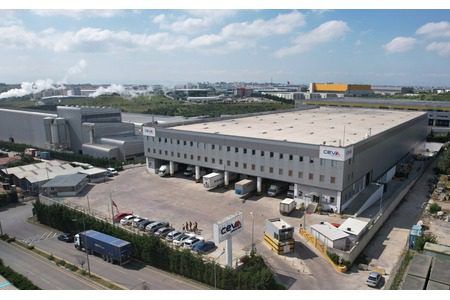Standing proud for the industry
Clare Bottle CEO, UK Warehousing Association talks exclusively to International Trade Magazine about the exciting future of the logistics industry
In your new appointment at the UK Warehousing Association, what experience do you bring to the role and are you looking to change anything?
I’ve worked in logistics for over 25 years, most recently running the UK warehousing for Coca-Cola Europacific Partners. Some people in the UK logistics sector may already know me from my time on the board of the Chartered Institute of Logistics & Transport, as a Trustee and Ambassador for the transport NGO Transaid, or as one of the founder members of Women in Logistics. I’ve always seen our industry as a community; one where I want to play my part. I do have a few ideas for change, particularly in relation to talent and sustainability, but I won’t be looking to shake things up straight away. I’m going to start by listening!
How do you think the Coronavirus pandemic has impacted the industry, and how have you been guiding your members?
The pandemic has had such a dramatic effect on society and the economy, unlike anything we’ve experienced in my lifetime. Its impact on warehousing included the direct demand for storage of scrubs, ventilators and other healthcare equipment: this is part of the reason why warehouse occupancy is at an all time high. Changes to consumer behaviour have driven unpredictable demand patterns too: the bridalwear depots were still full of unsold stock, whilst panic buying emptied out the toilet-roll warehouses! Some of the other effects are more subtle, such as the dichotomy between those who had to come to work in person and their colleagues forced to work from home. Or the availability of capital investment for new-build & automation projects. Or the public recognition of the role logisticians play: the UK’s vaccination programme has been both a victory for public health and a logistical triumph. Throughout the pandemic, the UKWA has been providing support to members, sharing best practice via webinars regarding Covid-safe workplaces, cascading government information as rules changed, ensuring logistics workers enjoyed the status of ‘essential workers’ and lobbying government for business rates relief. I’ll be ensuring the UKWA is pivotal in continuing to advise our members and share their real-life experiences with policy-makers.
With the pandemic, have you been able to deliver training and learning virtually? How important is education for the industry?
In some ways, you could argue that education has been even more important than usual during the pandemic. Personally, I studied a virtual short-course with Cambridge University – on Sustainable Supply-Chains – last year, which was a valuable way to maintain perspective during a difficult time. But not all learning is formally acquired: the apprenticeship model recognises this with its requirement for a portfolio of diverse practice. Schools have struggled to meet the employer encounters and workplace experiences they need to provide their students (Gatsby benchmarks 5 & 6) and, consequently, logistics will suffer because there is no GCSE or A level in warehousing or logistics, so unless children come across us via another route, they simply won’t know about the opportunities in our sector. Similarly, the UKWA has been unable to facilitate warehouse visits or participate in exhibitions, conferences and other chances to share best practice. I imagine there will be a lot of pent-up demand for “in real life” learning experiences, so it will be interesting to see how much remains online and what reverts to physical…
Sustainability is a big word in the market currently, how is this impacting warehousing?
Energy use in warehouses is changing, with the development of new temperature-control technology, the switch from diesel or gas to electric for mechanical handling equipment and the introduction of sensor-operated LED lighting. As well as the changes within the four walls of every warehouse, we’re also seeing increasing consumer interest in sustainability issues like food miles (which affects network design) and packaging (which influences the risk of stock damage). There will undoubtedly be change, but the UKWA is here to support its members so we can embrace the green revolution as an opportunity, not a threat.
You recently released a new report about growth and seismic changes in UK warehousing, what are some of the key findings?
We’re the fastest growing sector in the UK economy, delivering thousands of new jobs and the UKWA’s report on the size and make-up of the UK warehousing sector gives hard evidence of this. Not only are there more warehouses in the UK than six years ago, but on average they are 60% bigger too (average unit size increased from 217,000 sq ft in 2015 to 340,000 sq ft in 2020). Every single category, from mail services to high-street retail, occupies more space now than in 2015, with a noticeable shift towards 3PL operations. Predictably, the “golden triangle” in the Midlands, UK, remains the heartland of warehousing but, interestingly, we can see that manufacturing companies in particular, are “trading up” and moving from older premises to more modern facilities.
What do you think is the biggest challenge facing the logistics industry?
Transport minister Charlotte Vere was recently criticised for her comments about the driver shortage, but I agree with her. What Baroness Vere actually said was: “There’s a perception that the industry is crying wolf”. The skills shortage is most severe in HGV driving, but it also applies to warehousing, where there’s anecdotal evidence that fork-lift truck drivers, robotics engineers and warehouse managers are all in short supply too. And it’s exacerbated by the perception that we can cope. The sooner everyone wakes up to reality, the better the chances of collaborative partnerships between educationalists, politicians and industry leaders to tackle our talent gaps effectively.
Anything else to note?
Under my leadership, the UKWA will remain a place where dialogue and debate can thrive. With over 800 members, it’s unlikely that everyone in the organisation will agree and I imagine some of your readers will want to challenge my views too. My message to those people is: bring it on! And if you’re not already a member of the sector’s best trade association, please consider joining us today and make your voice heard.
To stay up to date on the latest, trends, innovations, people news and company updates within the global trade and logistics market please register to receive our newsletter here.
Media contact
Rebecca Morpeth Spayne,
Editor, International Trade Magazine
Tel: +44 (0) 1622 823 922
Email: editor@intrademagazine.com







